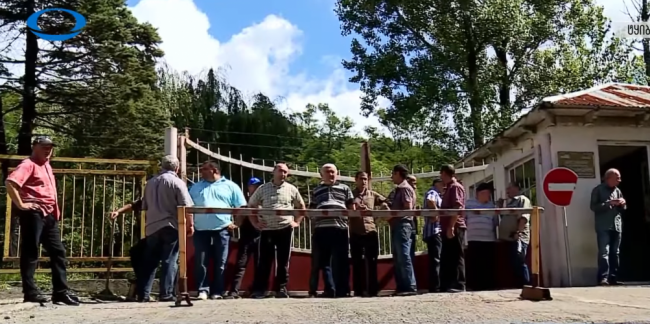

 A small group of miners gathered on Tuesday in front of the Mindeli mine shaft in the central Georgian town of Tkibuli demanding the administration of the company that owns the mine step down but insisting that operations should continue. Four died and six more were injured in an explosion in the mine on Monday.
A small group of miners gathered on Tuesday in front of the Mindeli mine shaft in the central Georgian town of Tkibuli demanding the administration of the company that owns the mine step down but insisting that operations should continue. Four died and six more were injured in an explosion in the mine on Monday.
On Tuesday, Health Minister Davit Sergeenko said that two of those injured in Monday’s explosion remain in serious condition.
In the aftermath of Monday’s deadly explosion, Georgian Prime Minister Mamuka Bakhadze announced operations in the shaft would be halted until a criminal investigation and an ‘extensive international engineering study’ was concluded. A number of MPs and President Margvelashvili voiced their support for the decision.
Pressure on the authorities to permanently close the Mindeli mine, which has seen a number of deadly accidents in recent years, increased after the latest incident. However, a number of miners and residents of Tkibuli have said they are against its closure fearing they will be left without employment.
Giga Gamezardashvili, whose father Mikheil was killed in Monday’s explosion, said that closing the mine was not the solution. ‘People have loans; 1,200 families work there and everyone would be hungry. [If the mine were to close], consider Tkibuli abandoned. The best option is to put workplace safety in order’, Gamezardashvili told Georgian media.
Former Minister of IDPs Sozar Subari, who was sent to Tkibuli by Prime Minister Bakhtadze, said the government now faced a dilemma, given that the mines continued to take the lives of workers but also provided employment to 1,500 locals who had few alternatives. ‘The factory will compensate workers for one month’s salary, the rest is to be negotiated between the company [LLC Saknakhshiri] and the government’, Subari said.
MP Roman Gotsiridze from the United National Movement (UNM) Party called the decision to temporarily shut down the Mindeli mine ‘unserious’, pointing to a lack of alternative jobs. ‘Closure [of the mine] means postponing dealing with the problem and avoiding responsibility’, Gotsiridze told TV Pirveli.
The Patriarch of Georgia Ilia II expressed his condolences to the families and loved ones of those killed on Monday, writing in his letter that ‘we probably have to do more to protect human life’.
‘Ineffective investigations’
On Monday, several leading Georgian rights group, including EMC, the Georgian Young Lawyers’ Association, and the Open Society Georgia Foundation, issued a joint statement giving the authorities one month to ‘outline a plan of alternative economic development for Tkibuli’.
In their statement, the groups criticised the government for its ‘failure’ to support the work of a special committee set up to examine the previous deadly incident in Tkibuli — which left six workers dead on 5 April.
The groups also took aim at the Interior Ministry for ‘ineffective investigations’ into workplace deaths, referring to the Public Defender’s report on the issue. According to the Public Defender, of 128 workplace accidents in 2017 that resulted in injury or death, 81 remained unsolved, and only 11 reached the courts. The groups called on the government to set up a special investigative committee to examine and evaluate the Interior Ministry’s work.









